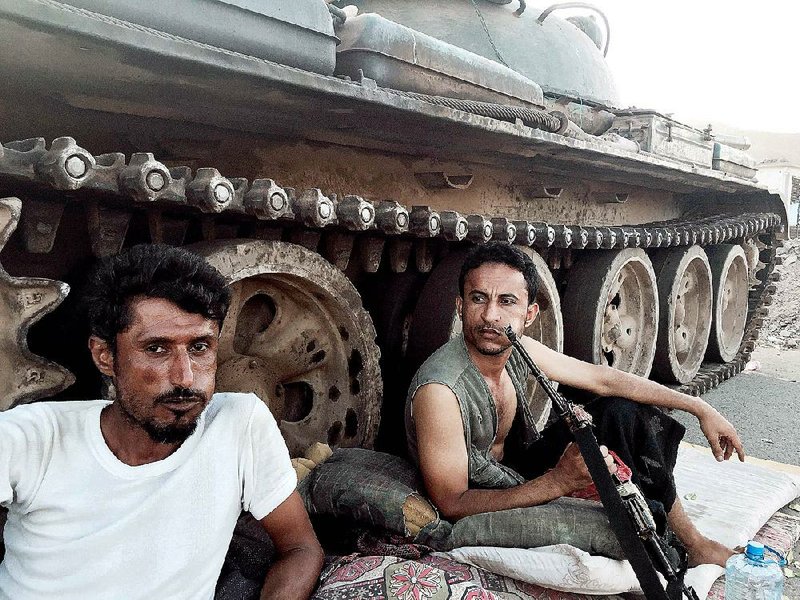ADEN, Yemen -- Yemen's Shiite rebels issued a call to arms Saturday to battle forces loyal to the country's president, as U.S. troops were evacuating a southern air base crucial to the United States' drone strike program after al-Qaida militants seized a nearby city.
The rebels, known as Houthis, swept into Yemen's capital, Sanaa, in September and now control it and nine of the country's 21 provinces. President Abed Rabbo Mansour Hadi, a one-time prisoner of the Houthis in his own home, escaped last month and installed himself in Aden, declaring it the temporary capital during the Houthi insurrection.
Earlier Saturday, Hadi gave his first televised address since fleeing the capital.
"My goal is to reunite, and to invite all political forces, including those who executed the coup against constitutional legitimacy," he said, referring to the Houthis.
He also pledged to raise the Yemeni flag over the Maran mountains, a stronghold for the Houthis, members of the Shiite Zaydi sect that represents nearly 30 percent of Yemen's population.
Hadi also said regional Shiite power Iran supported the Houthis, something critics also allege and the rebels deny. Sunni-led Persian Gulf countries have lined up to support Hadi and have moved their embassies to Aden to back him against the Shiite rebels.
Almost immediately after Hadi's speech, the Houthis issued a statement announcing their offensive against security and military institutions loyal to Hadi, calling it a battle against extremists.
"The council announces this decision to call the proud sons of the Yemeni people in all regions to unite and support and cooperate with the armed and security forces in confronting terrorist forces," they said in the statement carried by the Houthi-controlled state news agency SABA.
Though seizing power in Sanaa and clashing with those protesting their power grab, the Houthis largely haven't resorted to open warfare since beginning their campaign in September. Their statement Saturday immediately recalled the years of war fought in the country, once split between a Marxist south that was a British colony and a northern republic.
"I hate to say this, but I'm hearing the loud and clear beating of the drums of war in Yemen," Mohammed al-Basha, a spokesman for the Yemeni Embassy in Washington, wrote on Twitter.
Meanwhile on Saturday, U.S. troops including special forces commandos were evacuating from the al-Annad air base in southern Yemen, Yemeni security and military officials said. The officials did not say whether the troops had left the country.
The air base, the country's largest, was believed to have some 100 American troops stationed there. U.S. officials did not immediately respond to a request for comment Saturday.
Saturday night, a security official in Aden said a military transport plane from Oman evacuated 16 British military and security forces. He and other security officials spoke on condition of anonymity because he wasn't authorized to release the information.
On Friday, al-Qaida militants seized control of the southern provincial capital of al-Houta in the group's most dramatic grab of territory in years. That's just nearby the al-Annad air base, which has been the scene of rocket attacks in the past by militants.
Maj. Gen. Mahmoud al-Subeihi, the country's defense minister who is loyal to Hadi, said troops would be deployed near the base to protect it from militants.
The al-Annad base is where U.S. and European military advisers help Yemen battle the country's al-Qaida branch, al-Qaida in the Arabian Peninsula, through drone strikes and logistical support. That group, which holds territory in eastern Yemen, has said it directed the recent attack against the French satirical publication Charlie Hebdo in Paris.
U.S. forces also have been involved in at least two hostage rescue raids in Yemen in recent months, including one in December, during which militants killed an American photojournalist and a South African teacher.
It's unclear what the pullout will mean for the drone program. The U.S. has carried out more than 100 drone strikes in Yemen since 2009, according to the New America Foundation's International Security Program, which tracks the American campaign. Civilian casualties from the strikes have stoked anti-U.S. sentiment in the country.
The past days have brought reports of bloodshed across the country. On Wednesday, gunmen in Sanaa assassinated one of Yemen's most prominent dissident journalists. In Aden on Thursday, military units and militias armed with heavy weapons fought for control of the international airport.
On Friday, suicide attacks on a pair of mosques in Sanaa unleashed explosions that killed 137 people, including at least 13 children.
On Saturday, Maj. Gen. Mohamed al-Moayad, who had been in the Badr mosque when it was attacked, said he could not shake the image of parents searching for their children in the aftermath, a memory more painful even than the blast.
Al-Moayad was among those searching Friday. His eldest son, Ibrahim, 25, was killed, and another son, 12-year-old Majduddin, was wounded, he said.
"I lost one," the general said. "So did many fathers who were there."
A purported affiliate of the Islamic State claimed responsibility for the bombings, which also wounded 357 people -- raising the possibility that the extremist group has expanded its presence to Yemen after already setting up a branch in Libya.
U.S. officials expressed skepticism about the claim, though there have been several online statements by individual Yemeni militants declaring allegiance to the Islamic State.
Information for this article was contributed by Ahmed al-Haj, Brian Rohan and Jon Gambrell of The Associated Press and by Saeed Al-Batati, Kareem Fahim and Mohammed Ali Kalfood of The New York Times.
A Section on 03/22/2015

